Slow Food, Maine Lobster
continuted from November 2016 Homepage
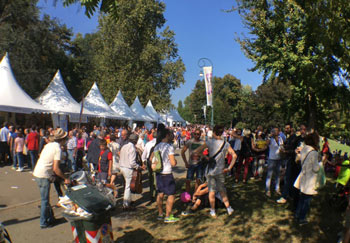
Every other year the international Slow Food movement hosts an event in Turin called Terra Madre (Mother Earth). It’s a celebration of small-scale farming and fishing. Fishermen, seafood dealers, and fisheries activists gather on the margins of the crush of people and food stalls to share views on the problems facing small scale fisheries and how to surmount them. Paul Molyneaux photo
“This is a false solution,” said Alexandersen. “There is no change. It only shifts the problem, and further encloses the commons.” Alexandersen asserted that large-scale wetlands restoration projects were being promoted as win-win for business and the environment, but were excluding fishermen from traditional fishing grounds. “It has led to the expulsion of entire communities,” she said.
Promoted by organizations such as The Nature Conservancy, the U.S. National Oceanic and Atmospheric Administration, and the World Bank, Blue Carbon projects appear to be rolling ahead under what many at Slow Fish see as a false banner of environmentalism. Michèle Mesmain, of Slow Fish, believes that the real agendas of the Blue Carbon proponents—privatization, and cashing in on ocean wealth—are masked by the language they use. “We need to develop language kits,” she said—basically, translation tools for drawing the real meaning out of the deceptive narrative designed to convince people that holding the environment hostage in exchange for carbon credits is our best option. “They should stop destroying valuable ecosystems because it is the right thing to do,” said Alexandersen. And many noted that healthy ecosystems produce more fish for fishermen to catch.
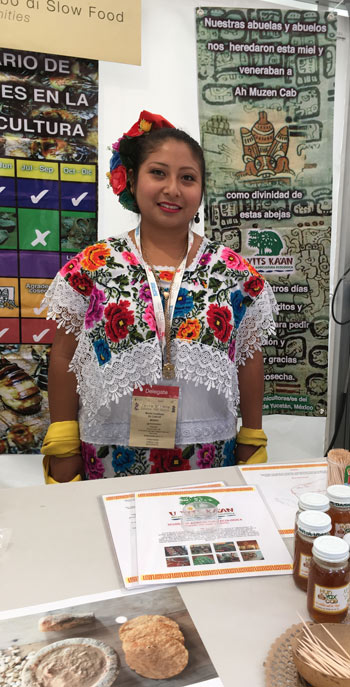
Slow Food Festival, Turin, Italy, September 2016. Woman from Mexico in traditional dress selling four-ounce jars of honey for twenty dollars each. “It’s medicinal. It comes from endangered bees in the jungle.” Paul Molyneaux photo
Filmmaker Mathilde Jounot expanded on the ocean-grabbing theme with a documentary, The Voice of the Invisible, which describes how large-scale NGOs, in concert with governments and international lenders such as the World Bank and the International Monetary Fund (IMF), buy debt from small island nations in exchange for establishing Marine Protected Areas (MPAs) that often exclude fishermen. The “debt for nature” swaps look good from a distance, Jounot’s film asserts, but give foreign NGOs jurisdiction over a nation’s marine resources.
The second day of the event brought many smiles, as fishermen from around the world shared stories of success. South African fishermen, shut out of their country’s quota management program, had won a critical court case that called their exclusion a “human rights violation.” It is a step in the right direction, although the fishermen are still waiting for quota.
“Many of us are fishing illegally, until we get quota,” said Nico Waldeck, of the grassroots organization Abalobi.
Fishermen from other parts of the world talked about restoring fisheries, rebuilding cultural connections, and protecting their resources from predatory exploitation. Tammy Lem, of Vancouver, described a new process for negotiating successfully with all stakeholders. “For starters, we leave quota allocation off the table, and focus on ecosystems” she said.
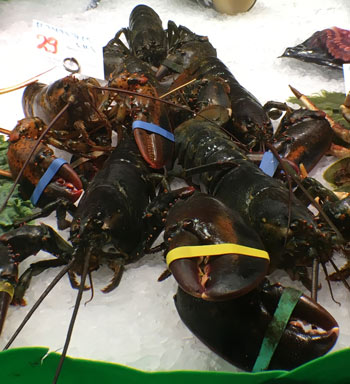
Maine lobster for sale at the Slow Food movement sponsored food festival in Turin, Italy. The winter holiday season in Western Europe has been a big market for Maine lobster. The slow, quality foods movement is expected to increase demand for high quality, wild caught seafood products like Maine lobster. Paul Molyneaux photo
In an interesting aside regarding local management, Michèle Mesmain discussed “elite capture of the process,” referring to how sometimes the most productive fishermen can dominate local management for better or worse.
“It’s important that the loudmouths not run the show,” said Abdulaye Ndiaye of Senegal. “But I might be one of those,” he added, laughing.
After that upbeat day, people who work in remote parts of the world realized they are part of a global effort to ensure a future for small-scale fisheries and fishing cultures.
But fish must go to market and the small-scale fishermen wondered how that could differentiate their product from industrial fisheries products, and get a higher return. The discussion began with the idea of an “Open Source Eco-Label” and lasted all day, with no shortage of disagreement dominated by two views. A vocal minority believed we should create an eco-label with a third-party certifier paid for by the fishermen, much like the system of the beleaguered Marine Stewardship Council (MSC), the most well known certifier of “sustainable” seafood.
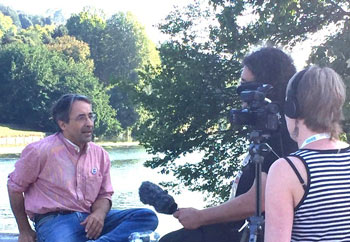
Paul Molyneaux, left, being interviewed by film maker Filip de Bodt at the Slow Food event in Turin, Italy, September, 2016. Molyneaux has covered small boat fisheries around the world.
On the opposite end of the spectrum people argued against any type of labeling program that mimicked MSC. “It will succumb to the same pitfalls of having to certify questionable fisheries in order to stay in business, and then losing credibility,” one speaker said.
“Besides,” said another, “eco-labels force us into the language of industrial fisheries. Is that what we want? Do we want to access commodity markets?”
People voiced different answers to the question. Yes, in sparsely populated areas with abundant fish, like Iceland and Alaska, fishermen need access to commodity markets; others do not. “There is not just one solution,” said Mesmain. “There are many.”
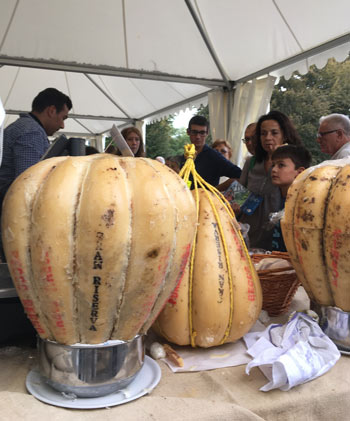
Turin, Italy, in the Po River valley is surrounded by historic farmland in the shadow of the Alps. Terra Madre (Mother Earth), a celebration of small-scale farming and fishing. Traditionally made and aged cheeses are some of the farm products for sale. Paul Molyneaux photo
After eight hours of debate, with a few stalwarts on both ends and a lot of flexibility in between, we finished the day by going around the thirty-odd people gathered and asked, What is the most vital thing we need in a system for differentiating our products in the market? Interestingly, the most-often repeated ideas, such as “a cohesive narrative,” “connection,” and “know your fisherman,” revolved around the most repeated word, “storytelling.”
And so I’ll close this with a story with a moral. While wandering around the event, I met a young woman from Mexico selling four-ounce jars of honey for twenty dollars each. “It’s medicinal,” she told me. “It comes from endangered bees in the jungle.” I believed her, and paid what seemed like a high price. But I ate some of that honey when I started to get a sore throat, and my sore throat disappeared. So it was worth it. The moral: If we want that rare product, we need to protect those bees, and if we want healthy seafood, we need to protect our fishermen.
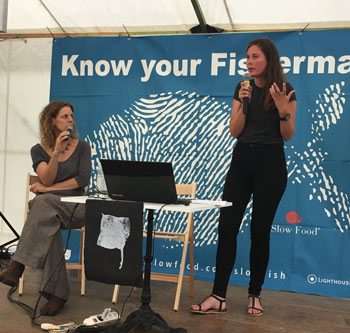
One of the topics at the event this year was privatization of the oceans, “ocean grabbing,” as host Michèle Mesmain, left, campaign organizer referred to it. Astrid Alexandersen, right, offered her critique of Blue Carbon Trading, acquiring credits not necessarily to reduce carbon output, but to generate credits that would be sold. Paul Molyneaux photo
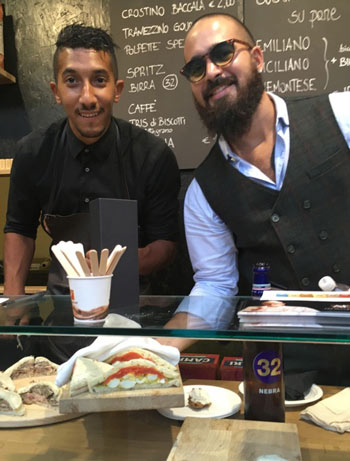
Alaskan wild salmon sandwiches offered at the Slow Food event is representative of the international reach of Alaskan salmon marketing efforts in recent decades. Paul Molyneaux photo
